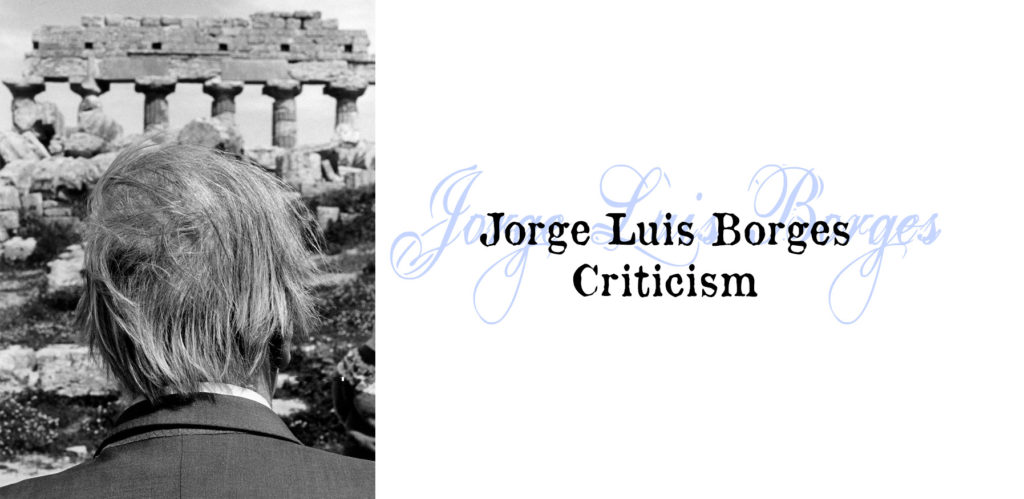Borges Criticism – Political & Theoretical Criticism
- At August 20, 2023
- By Great Quail
- In Borges
 0
0
The heresies we should fear are those which can be confused with orthodoxy.
—Jorge Luis Borges, “The Theologians”
Borges Criticism: Political & Theoretical Criticism
This page collects English-language “political and theoretical” criticism about Borges and his writing. These studies generally involve a strong political, theoretical, or philosophical component: Marxist critique, postmodernism, postcolonial studies, gender studies, queer theory, disability studies, etc. (A complete list of Borges Criticism can be accessed at the bottom of the page.) The books are listed in chronological order of publication. Clicking the image of a book takes you directly to Amazon.com. Wherever possible, links to the Internet Archive are provided. These “online editions” may or may not match the exact edition of the corresponding book.
Each book contains a brief description and a summary of its contents. Some have also been reviewed. If any knowledgable visitor would like to submit comments for any of the “unreviewed” works, please contact the Garden!
Jorge Luis Borges and His Predecessors
Notes Towards a Materialist History of Linguistic Idealism
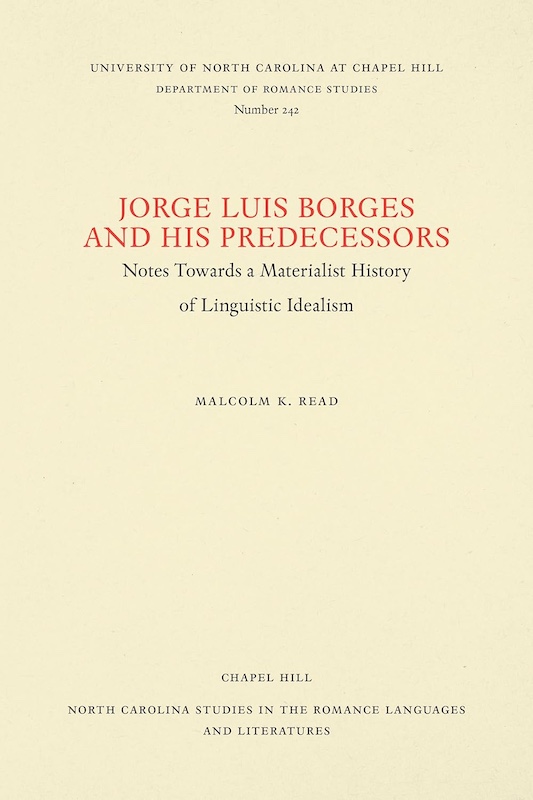
Jorge Luis Borges and His Predecessors: Notes Towards a Materialist History of Linguistic Idealism
By Malcolm K. Read
University of North Carolina Press, 1993
Online at: Internet Archive
Malcom Kevin Read is a British linguist and literary critic who studies “psychoanalytic Marxism.” His recent academic work “has focused on the construction of subjectivity in the pre- and early-modern periods and, more broadly, upon the epistemological and ontological dimensions of the human sciences.” He is Emeritus Professor of Hispanic Languages and Literature at Stony Brook University.
Publisher’s Description: Read locates both the work of Jorge Luis Borges and Western ideas on language in their historical context. He reviews the theoretically diverse critical approaches to Borges’s work, including both those that collude with the texts and others that are hostile to the Argentinian writer, and argues that all are inadequate for understanding Borges. He maintains that the modern subject is now characterized by narcissism associated with philosophical skepticism.
Table of Contents:
Introduction
I. From Classical Symbols to Medieval Signs
II. Public Usage and Private Abusage in the Age of Conflict
III. Monsters of Enlightened Reason
IV. The Ideal Revolution: Romanticism and Its Legacy
V. To Have and Have Not: Modern Literature as Fetishism
Conclusion
Bibliography
Reviews: Gustavo Fares’ review of Jorge Luis Borges and His Predecessors was published in Chasqui, Vol. 24, No. 2 (Nov. 1995): pp. 138–144, [JSTOR paywall]. Fares’ conclusion is excerpted below:
In Read’s reading, Borges’ predecessors are related to him through the agency of societal conditions, especially through the history of the bourgeoisie and capitalism. According to Read, Borges’ relationship to language changes along his career but, at the same time, it keeps alive the desire to be transparent, not to need interpretation, to be able to communicate directly the author’s and the reader’s souls. This desire stemmed from the fact that Borges, and the class to which he belonged, were interested in a language rooted in ideas, rather than in societal conditions, since the growing industrial capitalism of Argentina seemed threatening to Borges’ declining oligarchy. Read claims the particularly rapid growth of the industrial proletariat in Buenos Aires determined the effacement of the subject and of “the distinction between the ego and the unconscious” thus becoming “both everything and nothing.”
Read’s work is a valid Marxist perspective on Borges criticism, although it takes a most intricate language to make its point. Read’s style was, for this reader at least, the most difficult part to understand the book; it is convoluted, unclear and, although it makes its point, it renders his ideas hard to grasp. It also falls in some of the traps Read so lucidly locates in Borges. Having been to Jamaica, Read speaks of the effects of capitalism in the Third World, without qualifying that Jamaica’s capitalism may be somewhat different from Argentina’s, in terms of historical development and present day characteristics. For all its emphasis on concrete societal conditions and modes of production, Read’s book is rather general in several aspects of Argentinean and South American history. Terms such as “Third World,” “liberal,” “social liberation,” “social solidarity,” “the idealist,” have been somewhat overused in the past and tend to do exactly what Read hopes to avoid, that is “collapsing all differences into sameness.” In a Marxist analysis which focuses on specific societal conditions and on their relations to the superstructure, those terms beg for some clarification and/or roots in specific situations, countries, and time periods. If this is not the case the reader has the impression that parts of Read’s signifiers are coined and used to eliminate nuances and differences, as well as depth of analysis. Moreover, statements such as “It behoves to the Marxist to recall if not the hunger of the Third World then at least the unpalatable stodge of those whose lot it is to labour” seem not only general, but presumptuous. What is this “Third World” waiting the Marxist critic to be “recalled”? And what kind of “lot” is it to write yet another critical book on literature? This seems to be hardly the way to be considered part of the “lot.”
Borges and the Politics of Form
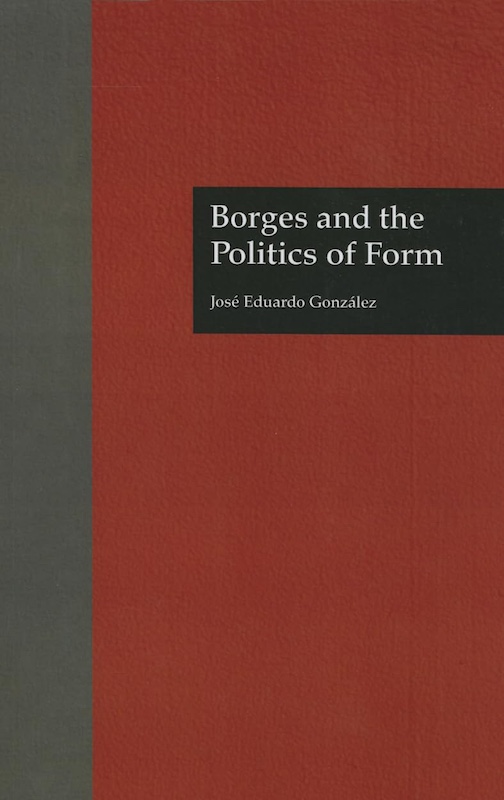
Borges and the Politics of Form
By José Eduardo González
Garland, 1998
José Eduardo González is Associate Professor of Spanish at the University of Nebraska, where he specializes in “Contemporary and Recent Latin American Narrative.” Borges and the Politics of Form is his first full-length book.
Publisher’s Description: Jorge Luis Borges—one of the most important Latin American writers—has also attained considerable international stature, and his work is commonly cited in a wide array of scholarship on contemporary fiction. Partly as a consequence of Borges’ international identity, and partly because of a long-standing view in Borges criticism that his writing is principally concerned with abstract ideas, critics have been reluctant to address the question of politics in his writing. Filling this critical gap, González begins by rejecting the proposition that Borges withdraws from the “real,” and provides a detailed analysis of the various political issues that Borges takes up in his essays and short stories. The author places particular emphasis on the turbulent questions that shaped Argentine social history during the period of Borges’ output.
Table of Contents:
Introduction
1. In Search of a Different Modernism
2. Thinking as Pleasure: Borges and the Culture Industry
3. Between Krazy Kat and Battleship Potemkin
4. La peinture de la pensée
5. The Other Face of Modernity: Borges as an Antifascist
Books and Bombs in Buenos Aires
Borges, Gerchunoff, and Argentine-Jewish Writing
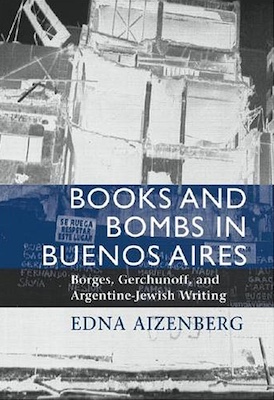
Books and Bombs in Buenos Aires: Borges, Gerchunoff, and Argentine-Jewish Writing
By Edna Aizenberg
Brandeis University Press, 2002
A professor at Marymount Manhattan College for over fifty years, Edna Aizenberg (1945–2018) was widely recognized a pioneer of Jewish studies in Latin American literature. Books and Bombs in Buenos Aires is the final of Aizenberg’s three books that focused on Borges.
Publisher’s Description: On July 18, 1994, the Asociacion Mutual Israelita Argentina (AMIA), which housed major Argentine Jewish organizations and served as a storehouse of Hebrew, Yiddish, and Argentine Jewish documents and literature, was bombed by terrorists. Although over 80 people were killed and the bomb leveled a city block in downtown Buenos Aires, the perpetrators were never found. Taking the bombing as her starting point, Edna Aizenberg crafts an unusual and powerful study of two canonical Argentine writers, Jorge Luis Borges and Alberto Gerchunoff. Examining in particular the literary and cultural reverberations in other authors of Gerchunoff’s 1910 story collection, The Jewish Gauchos and Borges’ Judaically inspired work, Aizenberg delves into the primary issues of Argentine and Latin American Jewish cultural production: Holocaust writing, resistance to dictatorship, pluralism and identity, and the position of the writer-scholar as a direct and vital participant in the transformation of culture and society. Situating Latin American Jewish literature within the multiple contexts of the Holocaust, postmodernism, and postcolonialism, Aizenberg argues that a literature celebrating pastiche, hybridity, and carnivalization is more democratic than literature that does not. She makes a brave case for the power of the pen in a contemporary world dominated by the power of the sword.
Reviews: Mónica Szurmuk’s review of Books and Bombs in Buenos Aires was published in Modern Fiction Studies, Vol. 50, No. 2 (Summer 2004): pp. 498–500, [JSTOR paywall]. She summarizes Aizenberg’s view of Borges quite succinctly: “Through a reading that highlights his critical stance on Nazism, Borges emerges not as the apolitical author he has been purported to be, but rather as a clairvoyant intellectual who stared at the horrors of the twentieth century in the face and denounced them.”
Additional Information
Aizenberg’s book is the product of her research into the religious politics of Latin America during the 1990s. See her article “Jewish Gauchos and Jewish ‘Others,’ or Culture and Bombs in Buenos Aires,” Discourse, Vol. 19, No. 1, “Secularism and the Future of Jewry” (Fall 1996): pp. 15–28, [JSTOR Paywall]; and “Postmodern or Post-Auschwitz: Borges and the Limits of Representation,” Variaciones Borges, No. 3 (1997): pp. 141–152, [JSTOR Paywall].
You Might Be Able to Get There from Here
Reconsidering Borges and the Postmodern
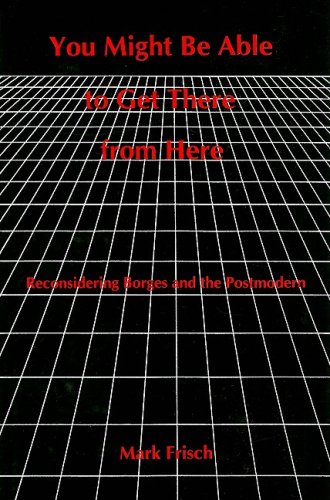
You Might Be Able to Get There from Here: Reconsidering Borges and the Postmodern
By Mark Frisch
Fairleigh Dickinson University Press, 2004
Online at: Internet Archive
Mark Fritsch is an associate professor at the Duquesne University. He has published extensively on Latin American literature, American postmodernism, William Faulkner, and the Holocaust. His first full-length book on Borges, You Might be Able to Get There from Here attempts to problematize the oft-repeated connection between Borges and postmodernism by examining how Borges himself expressed and reacted to “postmodern” ideas about the self, identity, and the universe. As Frisch writes in his introduction:
However, because of Borges’s role as a precursor or an early post-modernist, these same critics have often overlooked the way in which he not only challenges the “One” but also affirms the “Many.” He depends on the concept of a singular, totalizing vision, while acknowledging that we shall never attain such an understanding. His agnosticism does not become monistic in its negation. Neither is it an affirmation of chaos. Ultimately, the dichotomy between the “One” and the “Many” merge into irresolution in this labyrinth that expresses man’s and woman’s limitations. His vision continues to express and affirm certain values and urges us to define positive knowledge. Borges is a skeptical pluralist, but he avoids an absolute relativism. For Borges, the idea of the labyrinth does not automatically imply pessimism, chaos, and despair, but may suggest hope and affirmation. If the universe is a labyrinth, it has a center, For Borges, that suggests a coherent cosmos, although an inexplicable one. While such a pluralistic, labyrinthine universe may be indecipherable, certain journeys within the labyrinth or between labyrinths may still be possible. That is, we still might be able to get there from here, depending on where and how far we are attempting to go.
Reading Borges with an eye to the current debate over postmodernity and postmodern issues provides insights into aspects of his writings that have not been fully explored. It also helps introduce and clarify some of the defining themes and contentions of postmodernity. It provides the more thoroughly versed student of the postmodern with a perspective on that movement as seen from one of its early founders or precursors, and it highlights how that cultural discussion is caught in a similar debate between the “One” and the “Many,” between a radical relativism and an expression of the limits of pluralism, between viewing the universe as ordered but inexplicable and viewing it as chaotic, between affirming the possibility of positive knowledge and accepting a rather nihilistic attitude. In so doing, it underscores essential similarities and definitive differences between some present-day proponents of the postmodern turn and one of its founders.
Table of Contents:
- Introduction: “El Aleph” (The Aleph) and “La casa de Asterión” (The House of Asterion): Between Monism and Chaos
- A Latin American Postmodernism? A Borges Perspective
- Pluralism, Meaning, Postmodernity, and Borges
- Borges, the Self, and the Postmodern
- Women, Feminism, Postmodernity, and Borges
- Borges, Universal History, and Historical Representation
- Borges, Politics, and the Postmodern
- Borges, the Postmodern, and the Literature of the Americas: Cien años de soledad and The Universal Baseball Association, Inc., J. Henry Waugh, Prop.
- Borges in His Own Words and Some Implications for the Postmodern Debate
Reviews: Maarten Van Delden’s review of You Might Be Able to Get There from Here was published in Hispanic Review, Vol. 74, No 1 (Winter 2006):pp. 96–99, [Project MUSE paywall].
Jorge Luis Borges, Post-Analytic Philosophy, and Representation
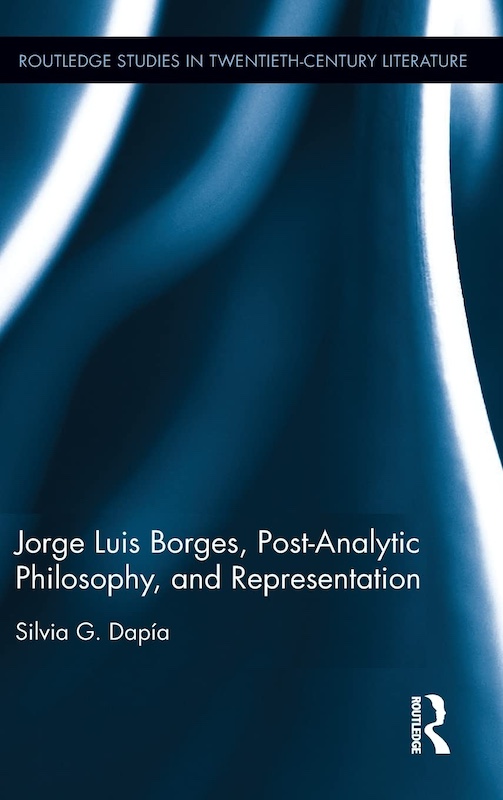
Jorge Luis Borges, Post-Analytic Philosophy, and Representation
By Silvia G. Dapía
Routledge, 2015
Silvia G. Dapía is Professor of Modern Languages at John Jay College, City University of New York, and the CUNY Graduate Center. She works “at the intersection of transnational studies, gender studies, and affect theory and politics of emotion in twentieth- and twenty-first century Latin American literature and culture, with emphasis on Southern Cone.”
Publisher’s Description: Making an important contribution to studies in Literature and Philosophy, this book reads Jorge Luis Borges philosophically, particularly in reference to his use of representation and reality. Rather than attempting to subordinate Borges to a set of philosophical constructs, to reduce Borges’ texts to mere exemplifications or illustrations of philosophical theories, the book uses Borges’s short stories to demonstrate how philosophical questions related to representation develop out of literature and actually serve as precursors to the various strains of post-analytic philosophy that later developed in the United States. The volume discusses American post-analytic philosophers Richard Rorty, Hilary Putnam, Donald Davidson, Nelson Goodman, and Arthur Danto, as well as a wide-ranging set of philosophical ideas including reflections on Keynes, Hayek, Schopenhauer and many others. Chapters offer detailed readings of Borges’ texts extending from 1939 to 1983, locating where he thematizes issues of representation, and pursuing the logic of Borges’s text toward its philosophical implications without neglecting their literary value. The book argues that Borges’ exploration of the relationship between representation and reality places him unmistakably in the position of a precursor to the post-analytic philosophers. Illuminating the role that language plays in the creation of reality and representation, this volume makes significant contributions not only to Borges scholarship but also post-structuralism, post-analytic studies of language, semiotics, comparative literature, and Latin American literature.
Table of Contents:
Introduction
1. Borges and Richard Rorty
2. Borges and Hilary Putnam
3. Borges, Nelson Goodman, and Arthur C. Danto
4. Encountering the Other: Borges, Donald Davidson and the Radical Interpreter
5. Self and Subjectivity
6. Conclusion
Reviews: David Laraway’s review of Jorge Luis Borges, Post-Analytic Philosophy, and Representation was published in Revista de Estudios Hispánicos, Vol. 53, No. 1 (March 2019): pp. 404–406, [Project MUSE paywall]. Rolando Pérez’s review appeared in the Arizona Journal of Hispanic Cultural Studies, Vol. 22 (2018): pp. 307–312, [Project MUSE paywall]. Both reviewers praise the book as being an important and long overdue contribution to Borge studies; although Laraway remarks that “one sometimes feels the marriage of philosopher and text has been at the barrel of a shotgun.” An excerpt from Pérez’s review provides a good overview of Dapía’s project:
Yet it is important to acknowledge from the outset, that there has always been not just one but many “Borgeses” that complement and contradict each other in ways that break with the law of non-contradiction, as in “The Garden of Forking Paths.” And this is the admirable virtue of Dapía’s beautifully written Jorge Luis Borges, Post-Analytic Philosophy and Representation, wherein the Argentine writer is treated not so much as a philosopher, but rather philosophically. And this is particularly important in light of the fact that Dapía places Borges, not amid Continental philosophers (who have always had a close connection to literature), but rather amongst “post-analytic philosophers” like Richard Rorty, Hilary Putnam, Donald Davidson, Arthur Danto, and Nelson Goodman. As she declares in the “Introduction,” her use of post-analytic philosophy does not imply “that Borges was interested in pursuing the problem of representation” as an analytic philosopher. The goal is “to read Borges philosophically.”
And this is what she does by intercalating the ideas contained in Borges’ short stories, essays, and poems with certain concepts of post-analytic philosophy that have to do with the nature of reality vis-à-vis the study of metaphysics and epistemology. Moreover, since the conversation here is not between science and philosophy, which would necessitate a mathematical and experimental approach, but rather between literature and philosophy, the major focus of Dapía’s book is the question of “representation.” As such, then, I will attempt to summarize for the reader, the way the author frames the various dialogues between Borges and each philosopher, and will argue that Dapía’s book is a major and unique contribution to Borges studies, in that it points to certain notions in Borges without which it is nearly impossible to understand what prima facie seem to be literary reiterations of language games. That, to a great extent has do with Borges’ (Kantian) notion of reality, and his use of irony, as well as his notion of writing as an “invention” of reality, and its impact on the question of “the Other” in anthropological terms.
Postcolonial Borges
Argument and Artistry
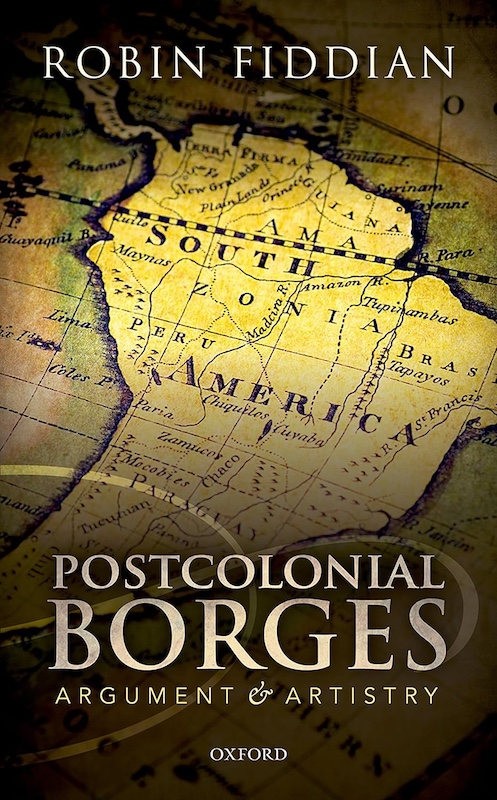
Postcolonial Borges: Argument and Artistry
By Robin Fiddian
Oxford University Press, 2017
Robin Fiddian is a Professor of Spanish and an Emeritus Fellow at Wadham College, University of Oxford. Specializing in Latin American literature and cinema, he has written extensively on Fernando del Paso and Gabriel García Márquez.
Publisher’s Description: Postcolonial Borges is the first systematic account of geo-political and postcolonial themes in a range of writings by Borges, from the poetry and essays of the 1920s, through the prose and poetry of the middle years (the 40s, 50s, and 60s), to the stories of El informe de Brodie and the poems of La cifra and other later collections. Robin Fiddian analyses the development of a postcolonial sensibility in works such as ‘Mythical Founding of Buenos Aires’, ‘Tlön, Uqbar, Orbis Tertius’, ‘Theme of the Traitor and the Hero’, and ‘Brodie’s Report’. He examines Borges’s treatment of national and regional identity, and of East-West relations, in several essays and poems, contained, for example, in Other Inquisitions and Seven Nights. The theoretical concepts of ‘coloniality’ and ‘Occidentalism’ shed new light on several works by Borges, who acquires a sharper political profile than previously acknowledged. Fiddian pays special attention to Oriental subjects in Borges’s works of the 70s and 80s, where their treatment is bound up with a critique of Occidental values and assumptions. Classified by some commentators over the years as a precursor of post-colonialism, Borges in fact emerges as a prototype of the postcolonial intellectual exemplified by James Joyce, Aime Cesaire (for example), and Edward Said. From a regional perspective, his repertoire of geopolitical and historical concerns resonates with those of Leopoldo Zea, Enrique Dussel, Eduardo Galeano, and Joaquin Torres García, who illustrate different strands and kinds of Latin American post-colonialism(s) of the twentieth century. At the same time, manifest differences in respect of political and artistic temperament mark Borges out as a postcolonial intellectual and creative writer who is sui generis.
Table of Contents:
Introduction: ‘Borges, Latin America, and Postcolonial Discourse’
- Setting the Political and Cultural Agenda: Selected Writings of the 1920s and 1930s from Inquisitions to Discussion
- Giving Voice(s) to Argentina: From ‘The Language of the Argentines’ to ‘Pierre Menard, Author of the Quixote’
- ‘Tlön, Uqbar, Orbis Tertius’: Reflections on/of Coloniality
- Self, Family, Nation: Writing Postcolonial Argentina in ‘Theme of the Traitor and the Hero’ and Other Texts
- Consolidating the Postcolonial Agenda: Culture and Politics in Selected Writings of the 1950s and 1960s
- Europe In the Dock: An Intertextual Reading of ‘Brodie’s Report’
- Borges the Post-Orientalist: Selected Writings of the 1970s and 1980s
Conclusion: ‘Borges, Politics, and the Postcolonial’
Reviews: Nora Benedict’s review of Postcolonial Borges was published in Comparative Literature Studies, Vol. 56, No. 1 (2019), [Project MUSE paywall]. Her opening provides an excellent overview of the book:
“Coloniality,” in the words of Walter Mignolo, “points toward and intends to unveil an embedded logic that enforces control, domination, and exploitation” (The Idea of Latin America, 6–7). As a concept it describes colonial rule in Latin America while simultaneously alluding to the aftermath of the fall of these empires in the contemporary world. Alongside this central idea are the theories of (post-)Occidentalism, (post-)Orientalism, and (post-)Colonialism, all of which form the bedrock of (Latin American) postcolonial studies. Robbin Fiddian’s Postcolonial Borges: Argument and Artistry couches its analysis in this rich theoretical tradition in an effort to examine how the work of Jorge Luis Borges maps onto the complexities of this field. To that end, Fiddian considers not only Borges’s frequent engagement with ideas of identity, coloniality, and empire, but also his musings on geopolitical and cultural themes throughout his lifetime. Starting in the 1920s and moving chronologically up to the 1980s, Fiddian carefully demonstrates how virtually all forms of Borges’s writing—poetry, fiction, and essay—contain a unique fusion of Argentine and non-Argentine referents that seamlessly elide his work with the postcolonial.
Fernando Galván’s review appeared in Nueva Revista de Filología Hispánica, Vol. 68, No. 1 (2020): pp. 330–338, [Spanish; JSTOR paywall].
Chaos and Cosmos
The Imaginary and the Political in Jorge Luis Borges
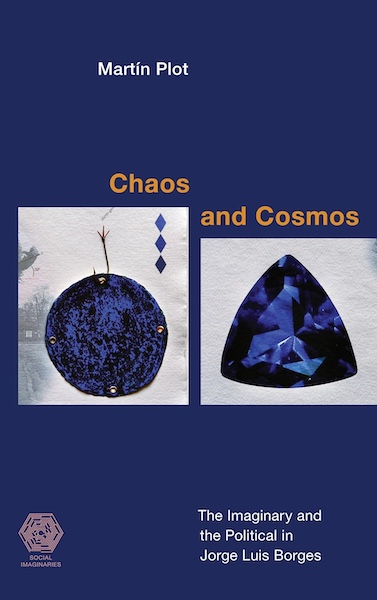
Chaos and Cosmos: The Imaginary and the Political in Jorge Luis Borges
By Martín Plot
Rowman & Littlefield, 2024
Martín Plot is Research Professor of Political Theory at the National Scientific and Technical Research Council and Institute of Advanced Social Studies in Argentina.
Publisher’s Description: Chaos and Cosmos offers a new and unique interpretation of Argentine essayist and fiction writer Jorge Luis Borges as a thinker of what continental twentieth century political theory called the political. While not a political writer in the traditional sense, Borges was indeed an author whose response to the advent of totalitarianism, in particular in its Nazi form, generated the most experimental, insightful, and rigorous short fiction and non-fiction political interrogation. As is well known, Borges’ writing went beyond originality; it created a genre of its own, and the Borgesian style is not limited to form. This Borgesian style fundamentally relates to how his response to the advent of totalitarianism led to sharp and philosophically sophisticated interrogations-in-fiction of the political, understood in this book as related to three main distinctive dimensions: that of the question of the forms of society, that of the relationship between the imaginary and the real, and that of the relationship between the same and the other. Chaos and Cosmos introduces the reader to Borges as an experimental writer, as an Argentine citizen, as a thinker of global political phenomena, and as a South American Pragmatist. The book also makes incursions in a political theorizing of its own, intertwining an interpretation of Borges’ essays and fiction pieces from the 1930s and 1940s with the central concerns of philosophers and political thinkers such as William James, Maurice Merleau-Ponty, Hannah Arendt, Claude Lefort, Michael Foucault, Richard Rorty, and Judith Butler.
Table of Contents:
Preface
Introduction
I. Contextualizing Borges
Chapter 1: Tlön as Political Form
Chapter 2: The Aleph and the Argentine Cultural Tradition
Chapter 3: History, the Mother of Truth
II. Interrogating the Political
Chapter 4: Chaos and Cosmos
Chapter 5: Dreams and Nightmares
Chapter 6: The Same and the Other
Bibliography
Index
Borges Criticism
Main Page — Return to the Borges Criticism main page and index.
General Criticism 1 — General literary criticism and commentary written during Borges’ life, 1957–1986.
General Criticism 2 — General literary criticism and commentary written from 1987 to 1999.
General Criticism 3 — General literary criticism and commentary written from 2000 to the present.
Poetics — Criticism written about Borges’ poetry and poetics.
Comparative Criticism — Borges criticism that compares Borges with other writers or locates Borges’ work within a broader literary context such as genre fiction or Latin American Literature.
Religious & Esoteric Criticism — Borges criticism from a religious, metaphysical, or esoteric perspective.
Scientific Criticism — Borges criticism within the disciplines of science, mathematics, and technology.
Author: Allen B. Ruch
Last Modified: 22 August 2024
Main Borges Page: The Garden of Forking Paths
Contact: quail(at)shipwrecklibrary(dot)com

